Time for Change?
March 2023
There are a host of rule changes coming to MLB in 2023: a pitcher/batter clock, defensive positioning restrictions, disengagement limits, and larger bases. I’m not generally in favor of dramatic changes to the way the game is played (I still hate the Manfred Man/zombie runner in extra innings, the 7-inning doubleheaders that were in effect for a couple of years, and the three-batter minimum for relievers, just to name a few) but I’ve been looking forward to the advent of the pitch clock. I’ve certainly sat through my share of games where slow workers like Clay Buchholz and Drew Pomeranz labored through their outings, and the thought of making those feel more like a crisply-paced Tim Wakefield or Chris Sale start is definitely appealing.
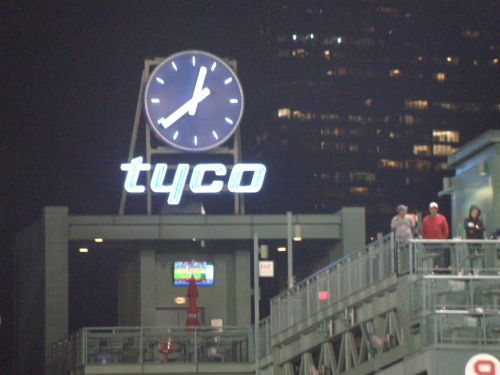
When Spring Training games started this year, with the new time limits being strictly enforced, the first few games almost felt too fast. (Of course, Spring Training games are always faster-paced than regular season games, as there’s minimal strategic maneuvering. Plus I was just watching on TV, rather than being there in person where I’d be more engaged.) That got me wondering about the times of the games I’d been to over the years. Has it really been increasing at the rate that it feels like, or was that just my perception because I remember all the games that were too cold or too hot or raining or late into the night more than the so-called normal ones?
A few years ago when I realized I was approaching my 500th game at Fenway, I compiled every Red Sox game I had attended into a spreadsheet. That’s now been updated to include time of game, and the results are in. Starting with my first game at Fenway in 1987, I’ve been to 602 Red Sox games. That counts 28 road games in 10 different ballparks, and 574 at home. My list includes 8 games that were less than 9 innings, due to rain or doubleheader rules, and 36 extra-inning games; I counted them all, rather than filtering on 9-inning games only, because I figure you never know what you’re going to get when you head out to a game or even turn on the TV. The end result was an average game time of 3:08, but here’s how that breaks down by year:
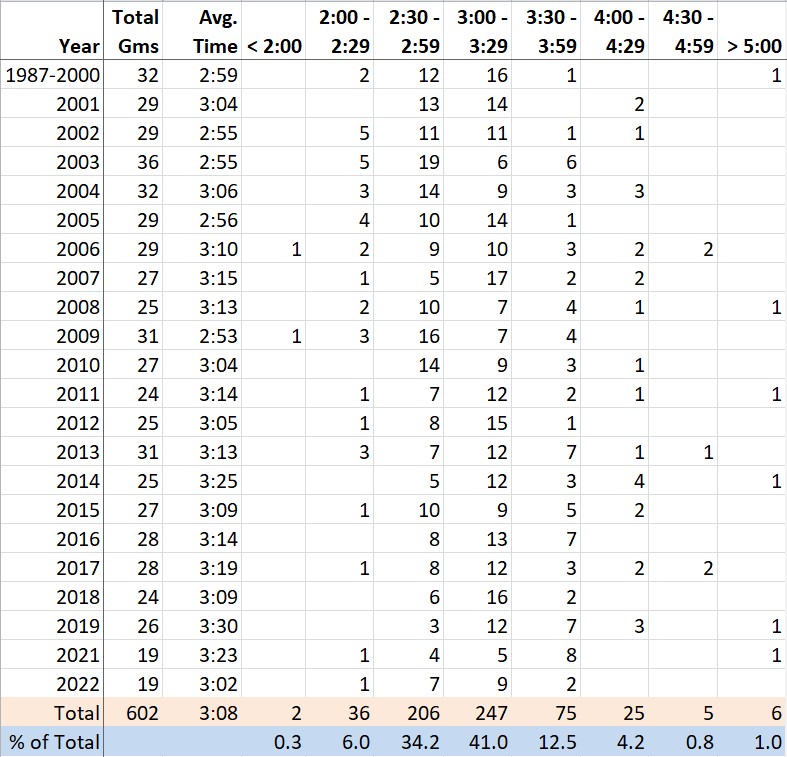
Just about 60% of the games I’ve been to in my life have gone over 3 hours, with 18.5% over 3:30. It’s interesting that some of the seasons in recent years with the shortest games are really bad years like 2012 and 2022, as well as a really really good year like 2018. But it’s certainly not my imagination that games have felt longer in recent years.
In the early years, I only went to a game or two a year, so 1987-2000 are consolidated into one line above, but here’s the breakdown of those years for completeness. 1994 certainly featured a variety of experiences, ranging from a 2-0 Roger Clemens victory in April (2:29) to a 12-inning 15-10 slugfest over Cleveland right before the strike in August (5:05).
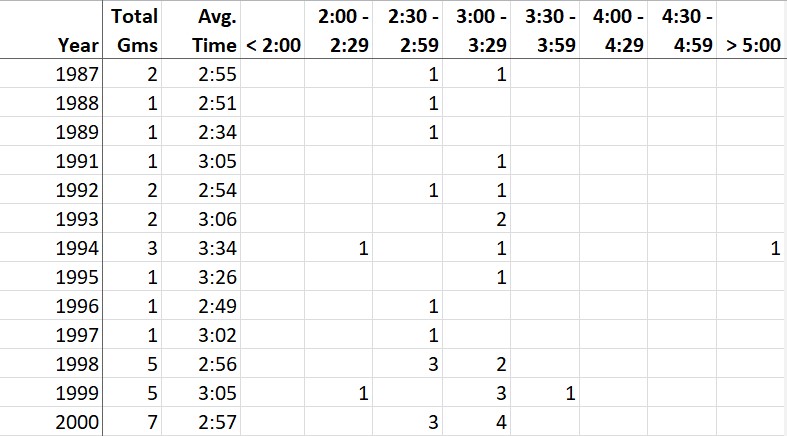
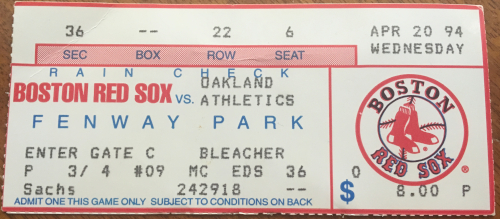
The shortest game I’ve ever attended was a mere 1:37. That was 10/1/2006, when Devern Hansack pitched 5 no-hit innings before the game was called due to rain. It didn’t feel short, though – there was a 3.5 hour rain delay before the game started, and then another 45 minutes after the tarp came back out before they made the official announcement. I had gone in when the gates opened and spent 8 soggy hours at the ballpark that day!
The longest game I’ve been to lasted 5:54. That was 9/17/2019, a 15-inning 7-6 loss to the Giants. With rosters expanded for September, the teams tied an ML record by combining to use an astounding 24 pitchers in the game.
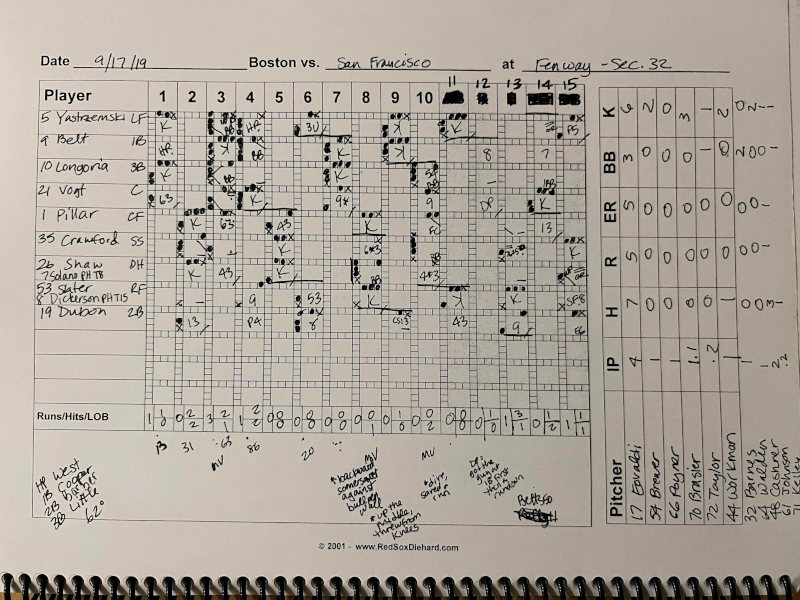
My quickest 9-inning game time was 2:06, which actually happened twice – 9/17/2002, a 4-2 win over Cleveland (with Tim Wakefield starting), and 6/16/2003, a 4-2 loss to the White Sox on the road in Chicago (Pedro Martinez vs. Mark Buehrle, another famous quick worker). It’s OK that that game was so short – I had taken advantage of a half-price ticket promotion, so I only paid for half a game anyway.
My longest 9-inning game is the longest one in MLB history – a brutal 14-11 loss to the Yankees on 8/18/2006 that went a mind-boggling 4:45.
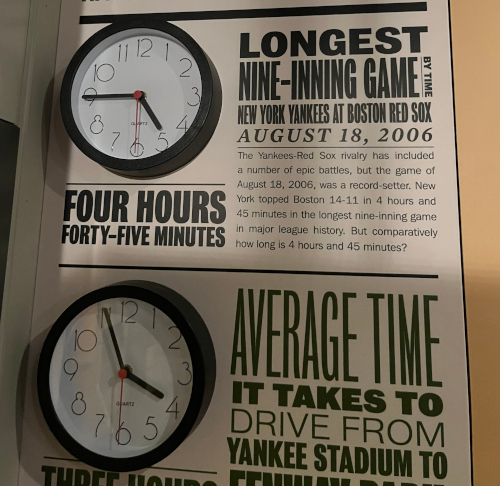
Here are some other personal “bests”:
- My shortest postseason game was ALDS Game 1 on 10/3/2007, a dominant Josh Beckett complete-game victory that took a mere 2:27.
- My longest postseason game was ALDS Game 3 on 10/10/2021, a 13-inning thriller that ended on a Christian Vazquez walk-off homer after 5 hours and 14 minutes.
- The 28 games that I’ve seen the Red Sox play on the road ranged from 2:06 to 3:29, with an average time of 2:51. Fifteen of those games were in NL parks before the universal DH (a recent change which I actually like by the way!) but that didn’t affect the game times, as I averaged 2:52 in those.
- The 59 games I’ve been to against the Yankees ranged from 2:15 to 4:46, with an average time of 3:22. The ultimate test of the new rules will be to see if that goes down in the coming years.
I was also curious how the games I happened to go to stacked up against the team’s total for the year. Here’s the breakdown for the past 22 seasons:
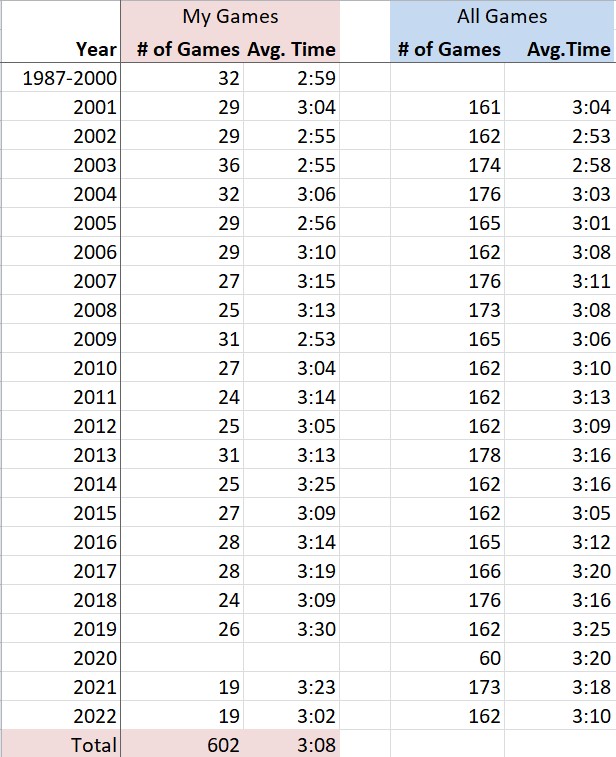
And, though my average times are pretty irrelevant when I only went to a couple per year, I wanted to see what the overall team average was for those years too:
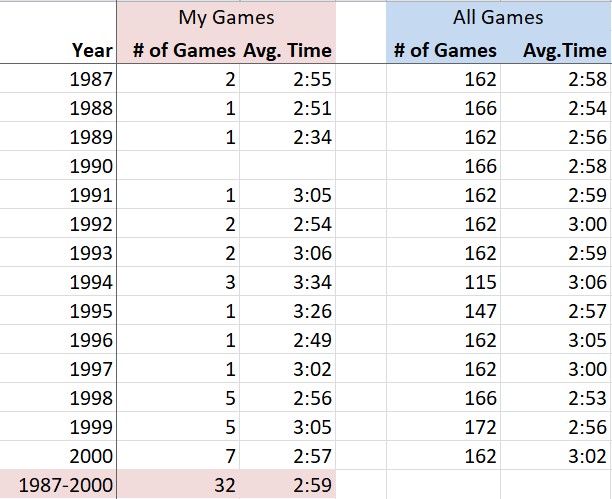
For most of my life, the average has been within a few minutes one way or the other of 3 hours, but 15 years ago that started to expand to 3:10, and then to 3:20, and beyond. When the new clock rules were introduced in the minors last year, they were found to shorten games by about 25 minutes. If that carries over to the majors this year, we’ll be back to a 3-hour average. I’m not looking for less baseball by any means – I’ve always liked to go in when the gates first open, and I stay till the end no matter what happens. I joke about long games giving me my money’s worth, and I believe a bad day at Fenway is better than a good day anywhere else. But if game times end up back around 3 hours again, then that will feel just right.
One last fun fact: If I total up all the times from every game I’ve been to (through the end of the 2022 season), it comes to 113,581 minutes… that’s 78 days, 21 hours, and 1 minute of baseball!



